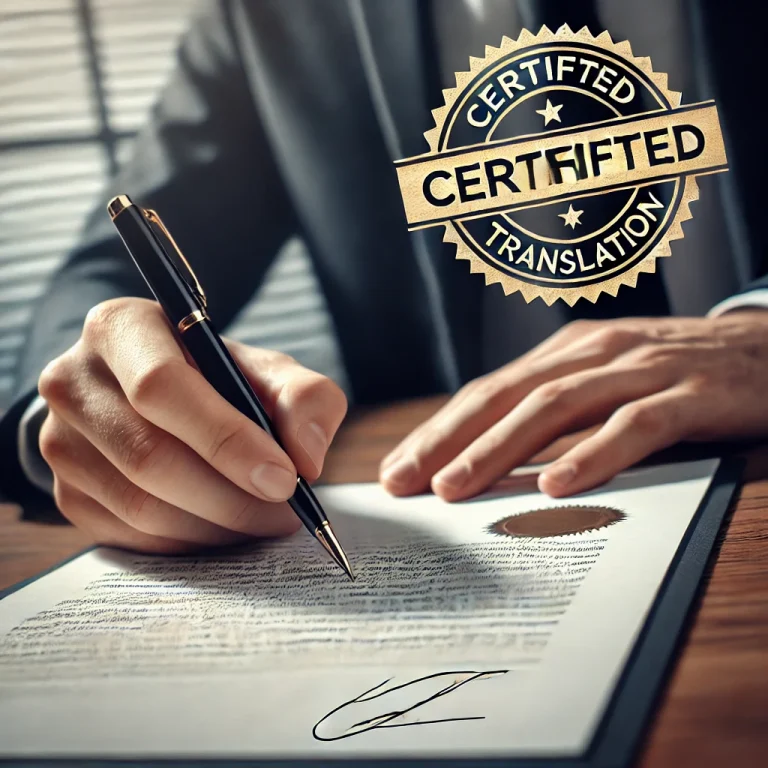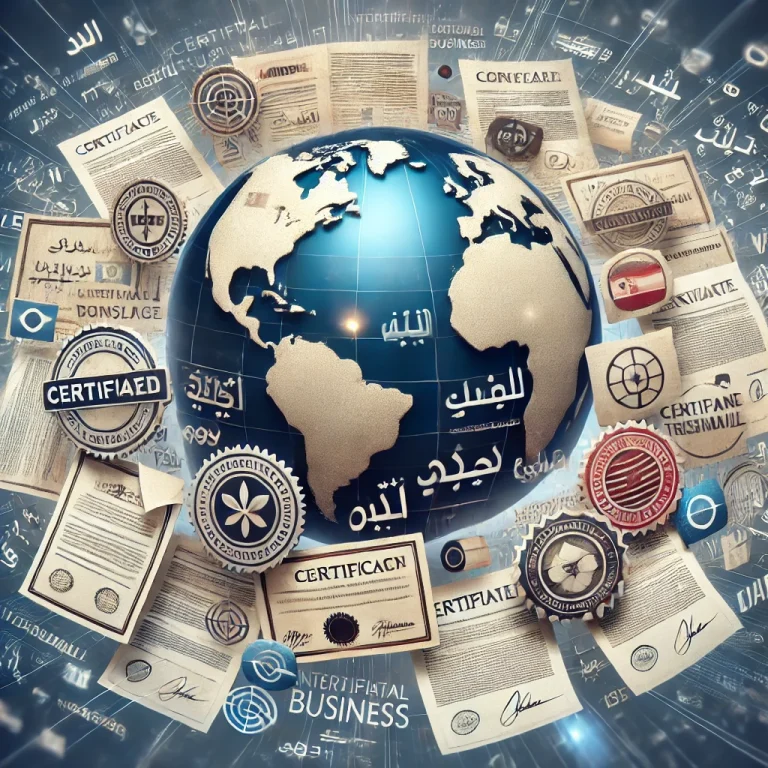In today’s increasingly globalized world, certified translation plays a pivotal role in ensuring international business operations are legally sound and culturally appropriate. Businesses dealing with contracts, legal agreements, immigration documents, and other official paperwork must rely on certified translation services to maintain the accuracy and credibility of their documents across language barriers. From protecting a company’s reputation to expanding into new markets, the necessity of certified translations cannot be overstated.
Understanding Certified Translation
What Is Certified Translation?
Certified translation refers to a translation process where the translator attests that the translated document is an accurate and complete representation of the original. This certification is often required for legal purposes, ensuring that the translation is trustworthy and legally valid.

How Certified Translation Differs from Standard Translation
While standard translation focuses primarily on converting content from one language to another, certified translation includes a formal process that confirms the accuracy of the translation. In many international business contexts, this certification is mandatory to meet legal or regulatory requirements.
Key Qualities of a Certified Translator
Certified translators not only have fluency in both the source and target languages, but they are also experts in the legal, technical, or business terminology specific to the documents they translate. They are often required to be accredited by professional bodies to ensure quality and accountability.
The Role of Certified Translation in International Business
Ensuring Legal Compliance in Global Markets
Businesses operating across borders must navigate diverse legal frameworks. Certified translation ensures that contracts, patents, and other critical documents are legally binding in multiple jurisdictions. For example, trade agreements between companies in the U.S. and Japan require accurate translations to uphold each party’s legal rights. Learn more international trade organizations for compliance requirements by clicking here or here.
Overcoming Language Barriers in Multinational Communication
Clear communication is fundamental to international business success. Certified translation helps prevent misunderstandings that could lead to costly errors, especially in formal documents such as certificate translation for product certifications or safety compliance. By working with professional translation services, businesses can ensure that their communications remain clear, accurate, and legally compliant. To learn more about navigating complex trade regulations, check out our guide on How It Expands Your Reach (2024 Guide).
Protecting Brand Reputation and Consistency
Consistent brand messaging is crucial for international success. Certified translation guarantees that marketing materials, corporate communications, and product documentation are accurately conveyed, thus maintaining brand integrity across different markets.
Legal Requirements for Certified Translation
Certified Translation for Immigration Documents
When expanding internationally, businesses may need to relocate staff or handle immigration matters. Certified translation is often required for immigration documents, such as visas, work permits, and residency applications, to comply with governmental regulations.
Certified Translation for Business Contracts
In international trade, contracts and agreements must be translated accurately to be legally enforceable in each party’s jurisdiction. Certified translation ensures that all parties have a clear understanding of their obligations and rights, mitigating the risk of disputes.
Compliance with International Standards
Many countries require businesses to submit certified translations for compliance with international regulations, especially in sectors such as healthcare, finance, and technology. Certified translation ensures that documents meet these stringent requirements, protecting businesses from legal consequences.
Benefits of Using Certified Translation for Business
Minimizing Legal Risks
Certified translation reduces the risk of misinterpretation, which could lead to legal challenges. By using certified translators who are trained in both language and legal concepts, businesses can avoid costly errors in legal documents.
Enhancing Cross-Border Communication
Successful international ventures depend on clear and effective communication. Certified translation ensures that essential documents like contracts, patents, and technical manuals are understood across languages, fostering smoother collaboration between international teams.
Boosting Credibility and Professionalism
Using certified document translation services signals a company’s commitment to accuracy and professionalism. It demonstrates to partners and clients that the business takes regulatory compliance seriously, enhancing its credibility in the global marketplace.
Industries that Require Certified Translation
Legal and Financial Sectors
Legal firms and financial institutions are some of the biggest users of certified translation. Whether handling international lawsuits or translating financial reports, accuracy and certification are essential to maintaining trust and legality in cross-border operations.
Healthcare and Pharmaceutical Industries
In healthcare, certified translation is critical for translating medical records, research papers, and drug approvals, ensuring compliance with regulations like the FDA or EMA. Accurate translation can be life-saving, especially when it comes to medical instructions and drug labels.
Government and Immigration Services
Government agencies often require certified translation for official documents, such as birth certificates, marriage licenses, and court rulings. Businesses dealing with these sectors must ensure that all documentation is certified to avoid delays or rejections in legal processes.
Why Certification Matters for Business Growth
Accessing Global Markets with Confidence
Certified translation is key to entering new markets. Whether negotiating with foreign partners or submitting applications for regulatory approval, certified documents provide confidence that business transactions are legally binding and understood by all parties.
Navigating Complex Regulations Across Borders
Different countries have different legal systems, and translating business documents incorrectly can lead to regulatory penalties or invalid contracts. Certified translation helps businesses navigate these complexities with greater assurance and legal backing.
Avoiding Costly Miscommunication
Certified translation helps prevent misunderstandings that could derail deals or partnerships. Legal documents often involve complex language, and mistakes in translation could result in legal liabilities or failed agreements.
Certified Translation vs. Machine Translation
Accuracy and Human Expertise
While machine translation has improved, it lacks the precision and understanding of context that human-certified translators provide. Certified translation involves a professional who is not only fluent in both languages but also understands the legal and cultural nuances of the document.
Legal Validity and Certification
Machine translation cannot provide the legal guarantees that certified translation offers. For businesses, having a legally valid document is non-negotiable when dealing with international contracts, patents, or compliance documents.
Limitations of Machine Translation in Legal and Formal Documents
Machine translation often struggles with technical and legal jargon, which can lead to errors. Certified translation, on the other hand, ensures that all terminology is correctly interpreted and that the translation is legally binding.
Selecting the Right Document Translation Services
Criteria for Choosing a Certified Translation Service
When selecting a translation service, businesses should consider factors such as the service’s reputation, expertise in specific fields, and accreditation by relevant professional bodies. Working with a professional translation company ensures that certified translations meet high standards.
How to Ensure Your Documents are Handled Securely
Confidentiality is critical, especially for sensitive documents. Reputable document translation services have strict security protocols in place to protect client data and ensure that documents are handled securely.
Cost Considerations for Certified Translation
While certified translation can be more expensive than standard translation, it’s essential to consider the risks of not having accurate, legally binding documents. Businesses should budget for this service as part of their global operations strategy.
Case Studies: Successful Use of Certified Translation in International Business
Case Study 1: Legal Compliance in Multinational Trade
In this case study, we examine how a global manufacturing company used certified translation to comply with international trade regulations, ensuring that all contracts and customs documents were legally valid in both the U.S. and the EU.
Case Study 2: Navigating Immigration Challenges in Business Expansion
An international tech company required certified translation to navigate complex immigration laws when relocating key personnel to a new office in South America. Certified translation helped the business secure work permits and comply with local laws.
Common Myths About Certified Translation
Myth 1: Certified Translation is Expensive and Unnecessary
While certified translation may involve higher costs, it’s a necessary investment for businesses dealing with legal documents, contracts, and compliance across borders. The costs of errors or non-compliance can far exceed the price of certified translation.
Myth 2: Any Bilingual Employee Can Provide Certified Translation
Only certified translators who are accredited by professional bodies can guarantee that a translation is accurate and legally valid. Bilingual employees may not have the expertise required for handling legal and technical terminology.
Myth 3: Machine Translation Is Just As Good As Certified Translation
Although machine translation can be useful for informal communication, it lacks the accuracy, cultural context, and legal validity required for formal documents. Certified translation ensures that documents are both linguistically and legally sound.
Frequently Asked Questions About Certified Translation
What documents need certified translation for business?
Documents such as contracts, legal agreements, immigration paperwork, and technical manuals often require certified translation for business purposes.
How long does certified translation take?
The timeline for certified translation depends on the complexity of the document and the language pair, but businesses should allow sufficient time for quality assurance.
How does certified translation differ from notarized translation?
Certified translation attests to the accuracy of the translation, while notarized translation involves an official who witnesses the signing of the certification. Some documents may require both services.
Conclusion: The Strategic Importance of Certified Translation for Global Business
Certified translation is indispensable for businesses operating in international markets. It ensures that all documents, from contracts to immigration forms, are accurate, legally compliant, and culturally sensitive. By investing in certified translation services, businesses can avoid legal pitfalls, protect their reputation, and confidently expand into new global markets.


